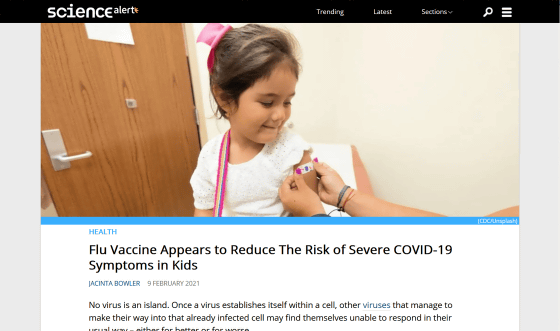Children vaccinated against influenza have been found to be less likely to develop a new coronavirus infection

While the new coronavirus is rampant around the world, it is reported that the
Cureus | The Flu Vaccination May Have a Protective Effect on the Course of COVID-19 in the Pediatric Population: When Does Severe Acute Respiratory Syndrome Coronavirus 2 (SARS-CoV-2) Meet Influenza?
https://www.cureus.com/articles/49162-the-flu-vaccination-may-have-a-protective-effect-on-the-course-of-covid-19-in-the-pediatric-population- when-does-severe-acute-respiratory-syndrome-coronavirus-2-sars-cov-2-meet-influenza
Study Shows Flu Vaccine Lessens COVID-19 Symptoms in Children --MU School of Medicine
https://medicine.missouri.edu/news/study-shows-flu-vaccine-lessens-covid-19-symptoms-children
Flu Vaccine Appears to Reduce The Risk of Severe COVID-19 Symptoms in Kids
https://www.sciencealert.com/children-vaccinated-with-the-flu-or-pneumococcal-shots-seem-to-have-milder-covid-19-cases

When one virus infects cells, it becomes difficult to infect other viruses, which is called 'virus interference', and it has been pointed out that virus interference occurs between RS virus and influenza, which cause symptoms similar to colds.
'Even if the first virus invader is an inactivated virus, such as the flu vaccine, virus interference can occur,' said Anjali Patwardhan, a pediatrician at the University of Missouri. So Patwardhan and his colleague Adrienne Ohler 's research team investigated how the risk of COVID-19 changes in children vaccinated with influenza and pneumococcal vaccines.
The research team analyzed data on 905 children under the age of 20 who were diagnosed with COVID-19 between February and August 2020, including whether or not they were vaccinated against influenza or pneumococcal vaccine, and the severity of their symptoms. did. In addition, it is said that it was considered that 'influenza vaccine was vaccinated' when vaccinated between September 2019 and April 2020.

Of the 905 patients included, 62.51% were asymptomatic, 33.2% were mild, 3.37% were moderate, 0.61% were severe, and 0.31% were fatal. It was. 48.51% of the respondents were vaccinated against influenza, and 51.49% were not vaccinated, which is about half of the total.
As a result of the analysis, it was found that 29.38% of children who were vaccinated against influenza had symptoms, while 36.48% of children who were not vaccinated had symptoms. It was also confirmed that the presence or absence of symptoms in the respiratory system and the rate of aggravation of symptoms tend to be lower in children vaccinated with influenza vaccine or pneumococcal vaccine.
The difference between vaccinated and unvaccinated children is about 6-10%, which may seem modest, but for large-scale infectious diseases, a few percent difference can kill many lives. There is a possibility to save. 'Based on this finding, the high incidence of COVID-19 in minority populations may reflect'low vaccination rates', apart from other health inequalities,' Patwardhan said. Mr. says.

'Understanding the relationship between COVID-19 and other viruses and knowing the status of vaccination in children may help develop the right strategy for best results,' said Patwardhan. comment. He argued that it is important to conduct larger, geographically and ethnically diverse studies in the future to investigate the relationship between vaccination and the symptoms of COVID-19.
Related Posts:
in Science, Posted by log1h_ik







